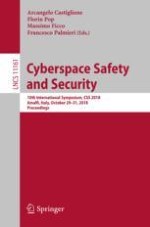
2018 | OriginalPaper | Buchkapitel
Who Is Reusing Stolen Passwords? An Empirical Study on Stolen Passwords and Countermeasures
verfasst von : Chedy Missaoui, Safa Bachouch, Ibrahim Abdelkader, Slim Trabelsi
Erschienen in: Cyberspace Safety and Security
Aktivieren Sie unsere intelligente Suche, um passende Fachinhalte oder Patente zu finden.
Wählen Sie Textabschnitte aus um mit Künstlicher Intelligenz passenden Patente zu finden. powered by
Markieren Sie Textabschnitte, um KI-gestützt weitere passende Inhalte zu finden. powered by